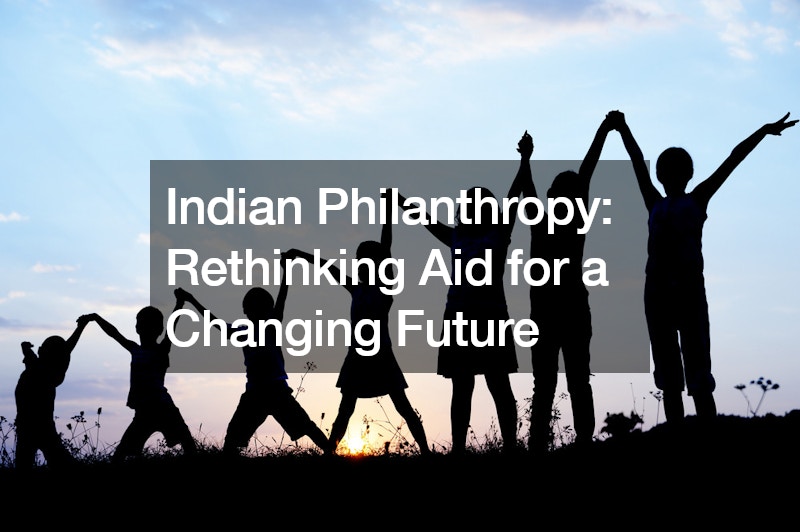India, a land of immense wealth and staggering disparities, presents a complex landscape for philanthropy. While generous donations have played a crucial role in social development, a call for a more strategic and future-oriented approach to charitable giving is gaining momentum. This article argues that Indian philanthropy needs to move beyond traditional models and embrace innovation to address the nation’s evolving challenges.
Beyond Charity: Building Systemic Change
While philanthropy plays a vital role in alleviating immediate needs, a singular focus on charity can create a cycle of dependence. The effectiveness of aid hinges on a robust ecosystem that facilitates its efficient distribution and long-term impact.
An Indian philanthropist must consider not just the “what” of giving, but also the “how.” Investing in capacity building for local organizations, strengthening infrastructure, and advocating for policy changes that address the root causes of poverty are crucial steps toward sustainable development.
Focus Areas for the Future
The landscape of Indian philanthropy needs to adapt to address emerging challenges. Education, healthcare, and environmental issues remain key areas. With a growing population and an increasingly urbanized society, ensuring access to quality education and affordable healthcare for all becomes paramount. Additionally, climate change poses a significant threat, and philanthropic efforts must prioritize mitigating its impact and supporting communities vulnerable to displacement.
Human Rights at the Core
The vast disparities in India necessitate a renewed focus on human rights as a guiding principle for philanthropy. Targeting aid towards the most marginalized communities, including women, children, Adivasi (indigenous) populations, and LGBTQ+ individuals, is critical. Philanthropic efforts must be guided by principles of transparency, accountability, and community participation. This ensures that aid reaches the intended beneficiaries and empowers them to chart their own path towards a better future.
Embracing Innovation for Uncertain Times
The future throws up a multitude of challenges, from the ever-evolving nature of work to the unprecedented displacement caused by climate change. Indian philanthropy needs to embrace innovation to address these issues effectively. Supporting social enterprises that develop sustainable solutions, fostering collaborations between diverse stakeholders, and investing in research and development hold immense potential.
Furthermore, Indian philanthropists can play a pivotal role in bridging the gap between government and civil society. By taking calculated risks and experimenting with innovative approaches, they can pave the way for solutions that traditional actors might hesitate to explore. This willingness to experiment is crucial for fostering a culture of learning and adaptation within the philanthropic sector.
Beyond Traditional Focus Areas: Expanding the Horizons
The traditional focus on education, healthcare, and environment is crucial, but Indian philanthropy also needs to address other pressing issues.
- Skill Development: The rapidly changing job market demands a skilled workforce. Philanthropists can support programs that equip young people with relevant skills, preparing them for the jobs of tomorrow.
- Livelihood Generation: Empowering communities by supporting micro-entrepreneurship and promoting financial inclusion is vital for poverty alleviation.
- Rural Development: The vast majority of India’s population resides in rural areas. Investing in sustainable agriculture, promoting rural infrastructure development, and addressing the challenges of migration are crucial for ensuring equitable development.
- Art and Culture: A vibrant art and culture scene fosters social cohesion and national identity. Philanthropy can play a vital role in promoting artistic expression and preserving India’s rich cultural heritage.
Collaboration for Collective Impact
Philanthropy flourishes best when it thrives on collaboration. Indian philanthropists can create a more significant impact by leveraging their resources and expertise. Forming partnerships with NGOs, government agencies, and other philanthropic organizations can foster knowledge sharing, eliminate duplication of efforts, and ensure a more coordinated approach towards social development.
Data-Driven Decision Making
In today’s information age, data plays a crucial role in maximizing the impact of philanthropy. By embracing data-driven decision making, Indian philanthropists can gain valuable insights into the effectiveness of their interventions, allowing them to allocate resources strategically and measure their progress efficiently.
The Road Ahead: A Call to Action
Indian philanthropy stands at a precipice of immense potential. By embracing a future-oriented vision, focusing on systemic change, and working collaboratively, Indian philanthropists can play a transformative role in shaping a more equitable and sustainable future for the nation. The time for incremental change is over. Indian philanthropy needs to step up, embrace innovation, and be the catalyst for a brighter tomorrow.
This shift requires a multi-pronged approach. Educational institutions need to develop courses that equip aspiring philanthropists with the necessary skills and knowledge to navigate the complexities of social change. Additionally, philanthropic organizations need to embrace transparency and accountability by readily sharing data and impact assessments. Finally, fostering a culture of open dialogue and knowledge exchange within the philanthropic sector is vital for continuous improvement.
In conclusion, Indian philanthropy holds the power to be a transformative force for good. By adopting a more strategic and long-term approach, Indian philanthropists can make a significant contribution towards building a more just and equitable future for all. The challenges are vast, but the opportunities are even greater. It is time for Indian philanthropy to rise to the occasion and rewrite the narrative of giving for a changing future.
.





